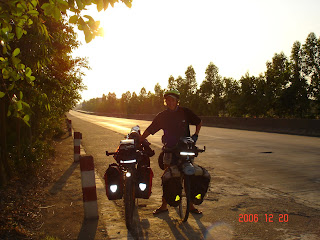The Vietnamese women
Beautiful, but tougher than tough and the real workers of the country – it appeared that the men spend their days mostly gambling or sipping super-strong Vietnamese coffee or rice wine.
Two girls in flowing and flattering silk Au Di - we gape as they cycle past, cool and beautiful – Gill and I sweating and full of dirt and grime and grease

 An industrious tour guide working the canals of Hoi Ann
An industrious tour guide working the canals of Hoi Ann An old lady hawking her wares on the beach from dusk to dawn in 40-degree heat
An old lady hawking her wares on the beach from dusk to dawn in 40-degree heat
 A fisher-woman waterproofing her basket-boat
A fisher-woman waterproofing her basket-boat
 When their hands grow tired, the women row their skiffs by foot
When their hands grow tired, the women row their skiffs by foot
 Hoi Ann, the town of a thousand tailors and of old-world charm – like photographs should be shot in black-and-white and sepia
Hoi Ann, the town of a thousand tailors and of old-world charm – like photographs should be shot in black-and-white and sepia In Saigon and Hanoi the pavements and streets are packed - the roar of hundreds of thousands of motorbikes a inescapable
In Saigon and Hanoi the pavements and streets are packed - the roar of hundreds of thousands of motorbikes a inescapable


 Finding peace and quiet in the early-morning dunes outside Mui Ne
Finding peace and quiet in the early-morning dunes outside Mui Ne







 ...And most spectacular of all, sailing on a scooner among the thousands of bizarre rock formations dotting Halong Bay
...And most spectacular of all, sailing on a scooner among the thousands of bizarre rock formations dotting Halong Bay












 Taking shelter from the wind in an abandoned old warehouse
Taking shelter from the wind in an abandoned old warehouse 

 Since we couldn’t read the route markers we bought a Mandarin map and simply pointed to our destination when asking for directions
Since we couldn’t read the route markers we bought a Mandarin map and simply pointed to our destination when asking for directions








 In stark contrast to the youth the older generations carry the scars of their great suffering and kept us at a safe distance.
In stark contrast to the youth the older generations carry the scars of their great suffering and kept us at a safe distance.


